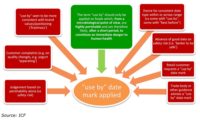According to leaked documents, food safety officials in the EU have dropped legislation that was supposed to limit the use of acrylamide, an “extremely hazardous substance”, according to the U.S. Environmental Protection Agency, and a chemical that has been previously linked to cancer.
Acrylamide is a chemical that naturally forms in starchy food products during every-day high-temperature cooking. It is mostly commonly associated with potato chips, coffee, crispy and soft breads and other foods via cooking methods like frying, baking, roasting or otherwise browning.
After increased pressure from the EU food industry, European food safety authorities appear to have done away with plans to limit the use of acrylamide in food, according to documents leaked this week. The leaked documents reportedly prove that food lobbyists influenced the EU's regulatory decision making process. Another part of the legislation was supposed to require food companies to conduct regular testing to ensure that levels of acrylamide in food products were as low as possible.
In June 2015, the European Food Safety Authority (EFSA) published its scientific opinion on acrylamide, stating that its presence in food is in fact linked to cancer in consumers of all ages. Despite the EFSA’s tests proving that exposure to acrylamide was both genotoxic and carcinogenic, ultimately causing damage to DNA and triggering cancerous cells, EU food officials are still balking at enforcing acrylamide restrictions.
The European Commission has reportedly said they are still pursuing the law to limit the use of acrylamide.
Related articles:
EFSA: Frying, Baking and Roasting Increases Risk of Acrylamide Exposure and Cancer
?How Safe are Snack Foods?




